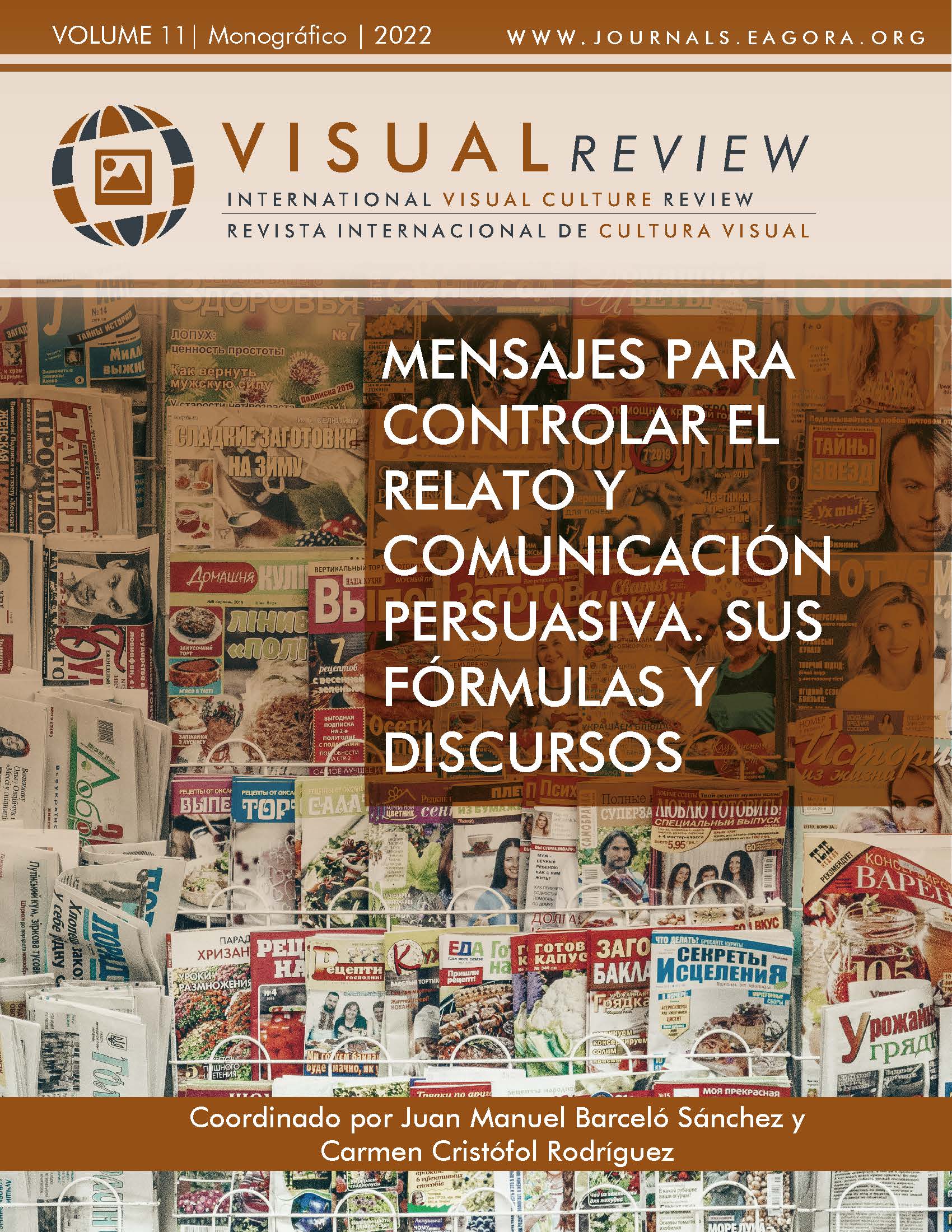The economic crisis of 2008 through four film documentaries
Testimony, debate and reflection
DOI:
https://doi.org/10.37467/revvisual.v9.3662Keywords:
Cinema, Visualization, Economic recession, Historical research, Perception, Testimony, KnowledgeAbstract
The purpose of this article is to study how the documentary represented the deep economic crisis that began in 2008 in Spain. We propose to apply a methodology of filmic analysis that let us generate a new knowledge about this issue. We will study Edificio España (Víctor Moreno, 2012), Libre te quiero (Basilio Martín Patino, 2012), VidaExtra (Ramiro Ledo Cordeiro, 2013) and Informe General II (Pere Portabella, 2015). Between the first film and the last one there is the following evolution: antecedents, the testimony of the protest, the debate on the immediate events and the analysis elaborated from a larger reflective distance.
Downloads
Global Statistics ℹ️
|
431
Views
|
293
Downloads
|
|
724
Total
|
|
References
Alvarado, A, & Barquero, C. (2013). Un despertar revulsivo: prácticas colaborativas en el documental sobre el 15-M.Fonseca, Journal Of Communication, 6(6), 304-324. https://bit.ly/3H8WfCr
Araüna, N., Quílez Esteve, L. (2018) Crisis económica, transformación política y expresión documental: crónica del anhelo (más que del cambio), Journal of Spanish Cultural Studies, 19 (4), 427-443, https://doi:10.1080/14636204.2018.1524992. DOI: https://doi.org/10.1080/14636204.2018.1524992
Aróstegui, J. (1995). La investigación histórica. Teoría y métodos. Grijalbo /Crítica.
Aumont, J., & Michel, M. (1990). Análisis del film. Paidós
Aumont, J. (1992). La imagen. Paidós.
Cameron, B. (2017). Crowd Control: Populism, Public Assembly, Institutional Crises, and Pere Portabella’s Informe general II. El nuevo rapto de Europa. Arizona Journal of Hispanic Cultural Studies 21, 159-185. https://doi:10.1353/hcs.2017.0009. DOI: https://doi.org/10.1353/hcs.2017.0009
Carrera, P. & Talens, J, (2018). El relato documental. Cátedra.
Casetti, F. & Di Chio, F. (1994). Cómo analizar un film. Paidós.
Catalá, J.M. (2010). Panorama desde el puente: Nuevas vías del documental. En A. Weinrichter (Ed.), DOC. El documentalismo en el siglo XXI (pp. 33-52). Festival Internacional de Cine de San Sebastián.
Chanan, M. (2007). The Politics of Documentary. British Film Institute. DOI: https://doi.org/10.5040/9781838711054
Collas, G. (1997). Cine europeo, el desafío de la realidad. Semana Internacional de Cine de Valladolid.
Estrada, I. (2017). “Democrazy” in Spain: Cinema and New Forms of Social Life in the Twenty-First Century. MLN, 132(2), 386-406. https://doi:10.1353/mln.2017.0023. DOI: https://doi.org/10.1353/mln.2017.0023
Fernández-Savater, A. (2012). El nacimiento de un nuevo poder social. Hispanic Review, 80 (4), 667-81, https://doi:10.1353/hir.2012.0038 DOI: https://doi.org/10.1353/hir.2012.0038
Hernández , E. (2004). Tendencias historiográficas actuales. Escribir historia hoy. Akal.
Kornetis, K. (2014) “Is there a future in this past?” Analyzing 15M’s intricate relation to the Transición, Journal of Spanish Cultural Studies, 15 (1-2), 83-98, https//doi:10.1080/14636204.2014.938432 DOI: https://doi.org/10.1080/14636204.2014.938432
Liberia Vayá, L. (2016). Un filme-diálogo para la transformación social: el poder del discurso colectivo. Revista Científica de Información y Comunicación, 13, 295–301. https://bit.ly/3H8l3dW
Moreno Nuño, C. (2018) Documentales sobre el 15-m: una modalidad plural para una revolución plural. Fotocinema (17),125 -149. https://doi.org/10.24310/Fotocinema.2018.v0i17.5104 DOI: https://doi.org/10.24310/Fotocinema.2018.v0i17.5104
Nichols, B. (1998). La representación de la realidad. Cuestiones y conceptos sobre el documental. Paidós.
Plantinga, C. (1997). Rethoric and Representation in Nonfiction Film. Cambridge University Press.
Revert, J., Álvarez, M., Cisquella, G., Guardia, I., Ledo, M. (2016). El documental en España: espacios de lo político. L’Atalante. Revista de estudios cinematográficos, 22, 101-111. https://bit.ly/3mvM2GH
Downloads
Published
How to Cite
Issue
Section
License
Those authors who publish in this journal accept the following terms:
-
Authors retain copyright.
-
Authors transfer to the journal the right of first publication. The journal also owns the publishing rights.
-
All published contents are governed by an Attribution-NoDerivatives 4.0 International License.
Access the informative version and legal text of the license. By virtue of this, third parties are allowed to use what is published as long as they mention the authorship of the work and the first publication in this journal. If you transform the material, you may not distribute the modified work. -
Authors may make other independent and additional contractual arrangements for non-exclusive distribution of the version of the article published in this journal (e.g., inclusion in an institutional repository or publication in a book) as long as they clearly indicate that the work was first published in this journal.
- Authors are allowed and recommended to publish their work on the Internet (for example on institutional and personal websites), following the publication of, and referencing the journal, as this could lead to constructive exchanges and a more extensive and quick circulation of published works (see The Effect of Open Access).














